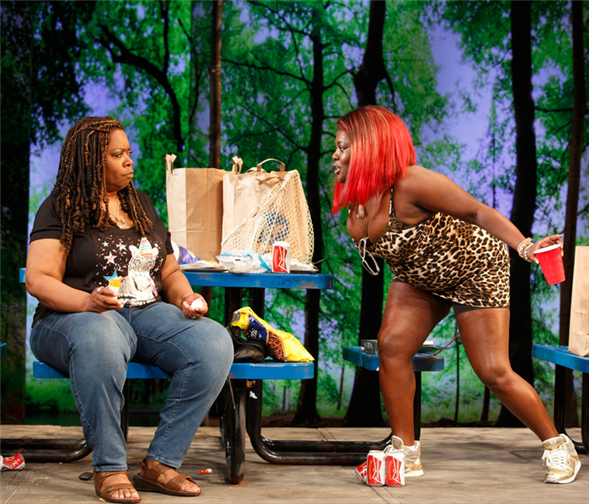Translate Page

Twenty minutes in, Robert O'Hara's new play Barbecue seems to be about just that: a barbecue. You see a family gathered in a public park, grilling, drinking, barking at each other the way only family members can. Then all the rules change, and you realize you were wrong about what's happening.
That surprise is very much in keeping with O'Hara's approach to playwriting. "I rarely have an idea for a play and go, 'That's the play,'" he says. "I have 10,000 ideas and they latch onto each other."
Seeing over 150 shows a year helps fuel the many influences and thematic ingredients in his head. "It all begins to mesh," he says. "You get a sense of what topics are being talked about, and you form your opinion on those topics. I don't have a play in mind; I have a zeitgeist."
It's a mentality that's reflected in the playwright's last New York hit, Bootycandy, an autobiographical comedy shedding light on what it means to grow up black and gay. That show bounced between scenes of evangelical church preaching, darkly violent sexual encounters, and sitcom-esque hijinks in the life of a 1970s family. The result was chaotic and comic, but it also made a coherent statement about the complexity of racial and sexual identities.
As O'Hara puts it, "In most of my plays there are twists and turns – things that are upended. I lead an audience down a path, then push them into oncoming traffic."
In Barbecue's case, those paths were inspired by everything from Facebook to addiction stories like James Frey's A Million Little Pieces to reality TV intervention shows. "It's not about addiction, but how we treat it in our entertainment," O'Hara says. As the O'Mallerys, a family of addicts, try to give their sister Barbara some tough love, it becomes apparent that everything they know about helping a substance abuser comes from pop culture. "I decided to write a play about a family doing an intervention, but [they] don't know how to do it. What happens when people who need an intervention do an intervention on someone else? And they do it at a barbecue, which is the most ridiculous place to do an intervention."
{Image1}
In some cases, themes the playwright didn't initially want to include ended up back in the story. When a friend suggested writing about race relations, for instance, O'Hara balked, but then he began tying that idea into his thoughts on addiction and recovery. "I would see a lot of reality shows about people getting better, and it was mostly white folks; you rarely saw black people on these shows, which was very odd for me." He also didn't intend to incorporate LGBT issues into the play, only to realize during rehearsals that they had crept in on some subconscious level.
Inspiration also came from contemporary classics such as August: Osage County and Angels in America — "those plays that really get messy," as O'Hara says. "I don't get into plays that are sort of two and a half hours about one idea. I think plays should be complicated. Audiences should have to work. There are enough plays out there specifically for people's enjoyment. There's enough in Barbecue to complicate your enjoyment."
---
TDF MEMBERS: We've recently offered discounted tickets for this show. Click here to see all the available member discounts.
Follow Jack Smart at @JackSmartWrites. Follow TDF at @TDFNYC.
Photos by Joan Marcus. Top photo: Benja Kay Thomas and Heather Alicia Simms in "Barbecue."